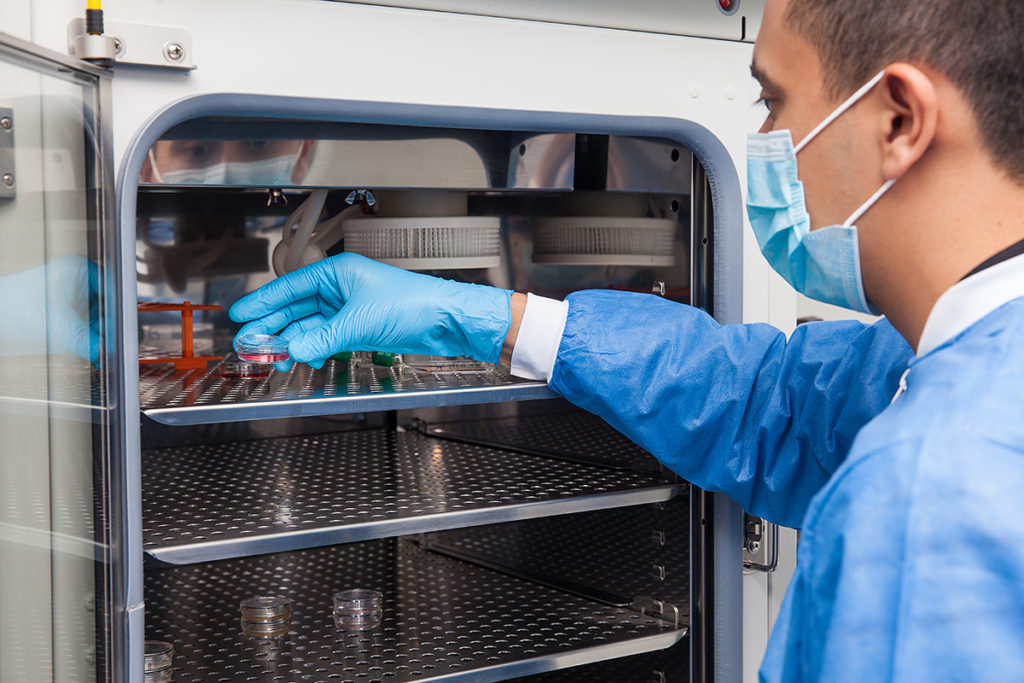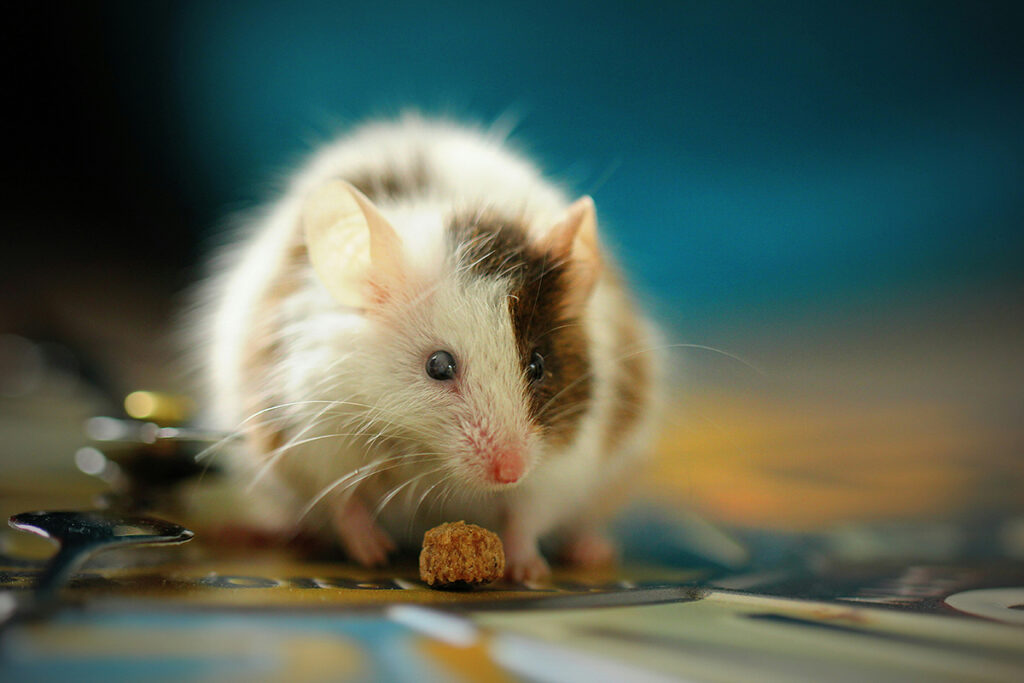Vaccination is the most effective protection against infections. The vaccine stimulates adaptive immunity to form a long-term memory of dangerous foreign genes. When faced with a real disease, immune memory cells are quickly activated, quickly suppressing the infection. Some memory cells, T-lymphocytes, directly destroy dangerous organisms. Others, B-lymphocytes, produce unique proteins – antibodies that mark foreign molecules and infected cells. Objects marked with antibodies are easily detected and destroyed by innate immune cells. The more the body produces antibodies of various subtypes due to vaccination, the more influential the vaccine is.
Specific compounds called adjuvants are to enhance the effect of vaccines. Experiments on mice have shown that interferons, the immune system’s primary signaling proteins, express an adjuvant activity. Interferons are known as molecules that provide natural antiviral protection. However, their role in adaptive immunity and adjuvant properties remain poorly understood.
Adjuvant features of different types of interferons
Interferon type I (IFN-I). IFN-I stimulates the production of antibodies in response to the vaccine’s introduction and can enhance other adjuvants’ effect. This interferon also helps T-lymphocytes learn to recognize dangerous genetic forms and protect them from innate immune cells’ excessive activity. Type I interferon also increases long-term immunological memory by directly affecting B-and T-lymphocytes.
Type III interferon (IFN-III). This interferon also stimulates the production of antibodies, but only when used nasally. With subcutaneous and intra-abdominal injections, it was useless. Under the influence of type III interferon, B-lymphocytes learn to produce antibodies faster. IFN-III stimulates immune cells to more actively delivering fragments of viral proteins from the respiratory tract to the lymph nodes for training B-lymphocytes. Also, this interferon increases the immunity of the mucous membrane. It promotes the production of a protein that activates the immune cells of the epithelium.
In 2009, a clinical study was conducted that compared the effectiveness of different adjuvants in vaccinating humans and mice. Unfortunately, no human benefit has been identified from IFN-I as an adjuvant. Therefore, for a more detailed study of the adjuvant properties of interferon, scientists returned to experiments on mice.
In 2019, an international group of scientists from Germany, Denmark, and Sweden conducted a comparative study of type I and type III interferons’ ability to regulate adaptive immunity during vaccination. The researchers found that each interferon type increased individual classes of antibodies, with little effect on others.
In a series of experiments, the researchers compared the immune responses of wild-type mice and mice with different immune deficits.
Comparison of mechanisms of adjuvant activity of different types of interferons
In the first experiment, mice were infected with type-A influenza. At 21 days after infection, the scientists compared the levels of different classes of antibodies.
In mice with IFN-I receptor deficiency, the level of IgA class Antibodies was 2 times lower than in wild mice. Also, IFN-I-deficient mice had a slightly reduced overall IgG antibody level. However, inside the IgG class, the Picture changed a lot. In mice with IFN-I deficiency, the level of IgG2c was 20 times lower, and IgG1 was comparable to the group of wild mice.
In mice with IFN-III receptor deficiency, the reverse pattern was observed in IgG subclasses. IgG1 was 20 times lower, and IgG2c was comparable. The level of IgA class antibodies in these mice was 3 times lower than in wild-type mice.
This experiment revealed a strikingly different role of IFN-I and IFN-III receptors in producing IgG subclass antibodies during viral infection.
Comparison of type I and type III interferons in intranasal influenza vaccination
In the next experiment, the researchers studied how different types of interferons affect antibodies’ production during vaccination. Since IFN-III exhibits adjuvant properties only when administered nasally, the vaccine and interferons were used in this way: through the respiratory tract.
In the first step of the experiment, mice were injected with the vaccine against type-A influenza. One group of mice received only the vaccine. The second group of mice received the vaccine together with hybrid human interferon type I. The third group, in addition to the vaccine, also received mouse interferon type III.
Mice that received only the vaccine had low levels of all classes of antibodies. Mice that received human IFN-I with the vaccine had a 10-fold increase in IgG1 and IgG2c antibodies compared to the first group. The level of IgA antibodies was increased 3 times. The third group of mice that received type III mouse interferon and the vaccine showed a result similar to the previous experiment. Their level of IgG1 antibodies was 15 times higher compared to the first group. The IgG2c level was the same. And the IgA level is 4 times higher.
In the second step of the experiment, the researchers studied the differences in the adjuvant properties of interferons of types I and III. An earlier study showed that type III interferon increases adaptive mucosal immunity in two stages. First, interferon triggers the synthesis of a particular protein. This protein, thymic stromal lymphopoietin (TSLP), in turn, stimulates the production of IgG1 and IgA antibodies. Therefore, it was important for researchers to determine whether the adjuvant effect of type I interferon depends on TSLP in the same way as the effect of type III interferon.
The researchers used the same nasal influenza A virus vaccine, a hybrid human interferon type I, and 4 groups of mice to answer this question. The first two groups are wild-type mice. One group received only the vaccine, while the other received the vaccine and interferon as an adjuvant. The second two groups of mice were deficient in receptors for the TSLP protein, a key element of IFN-III adjuvant activity. These mice also received either only the vaccine or the vaccine together with interferon.
As a result, it was found that all mice that received the vaccine together with IFN-I had significantly higher antibody levels than mice that received the vaccine alone.
Thus, as a result of the experiment, it was proved that the adjuvant activity of type I interferon does not depend on TSLP protein synthesis. These combined results show that type I and type III interferons’ mechanisms of adjuvant abilities differ significantly.
Type I interferon activity during intraperitoneal vaccination
In the third experiment, the researchers studied the adjuvant activity of type I interferon during intraperitoneal vaccination.
In the first step of the experiment, the same influenza A vaccine was used, as in the previous case. Scientists immunized two groups of mice with the vaccine. One group received only a vaccine injection, and the second received a vaccine injection enriched with hybrid human interferon type I.
The result of this experiment confirmed the previously identified trend. In the mice that received additional IFN-I, the level of IgG2c antibodies was 30 times higher than in the first group. And the level of IgG1 was only 10 times higher.
In the second part of the experiment, scientists studied the stimulating effect of IFN-I on a four-valent vaccine: from two type-A influenza virus strains and two influenza type-B. Due to the immune response’s weakness after the first vaccination, a second one was carried out.
The result of the experiment was also similar. In the group with additional type I interferon, IgG2c antibody levels were increased 10 and 30 times after the first and second immunizations, respectively. And the level of IgG1 in the group with IFN-I was increased by only a few tens of percent.
Thus, the scientists were able to show that the adjuvant activity of type I interferon does not depend on the method of administration.
IFN-I vaccines provide enhanced protection when infected with a lethal dose of the virus
In the final experiment, the scientists evaluated the physiological significance of the results obtained in previous experiments. Wild-type mice were infected with a 20-fold lethal dose of a highly virulent strain of influenza a virus. The portion of mice that received only the vaccine quickly lost weight. On day 5, everyone was put to sleep, since the weight loss was 25%. Mice that were immunized with the interferon type I vaccine had a fewer weight loss and half of these mice survived and returned to average weight in 2 weeks.
This experiment shows that type I interferon improves the protective activity of the vaccine.
Conclusion
This study demonstrates some unique features of type I and type III interferons as vaccine adjuvants. These features can be taken into account to improve existing vaccines for farm animals and humans. Unfortunately, it remains unclear whether interferons will exhibit similar adjuvant activity in non-rodents.



